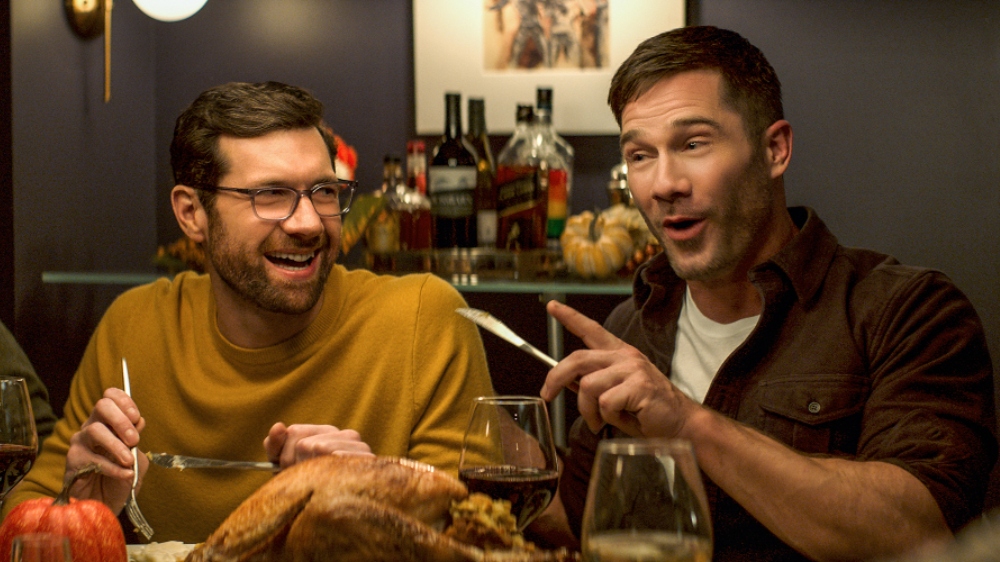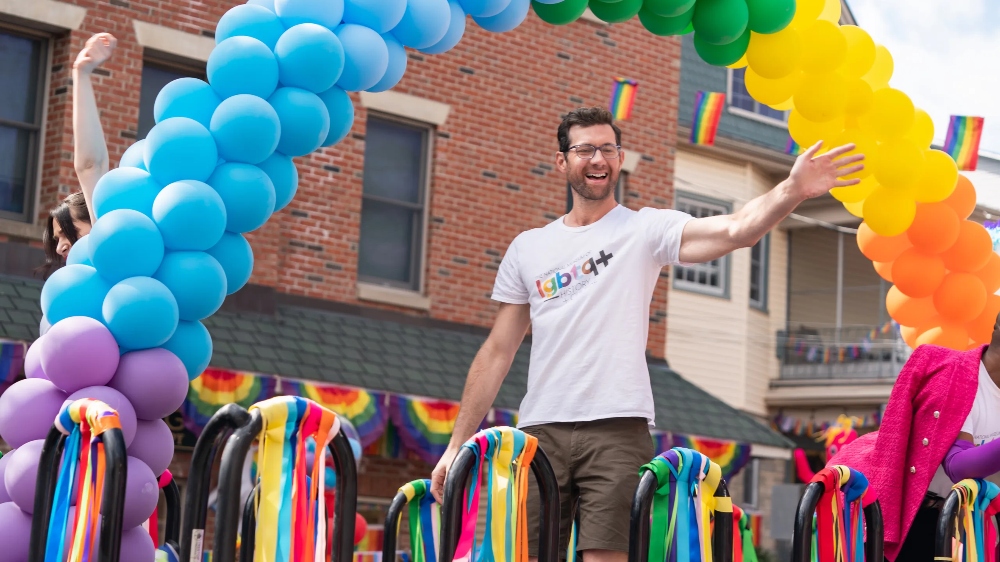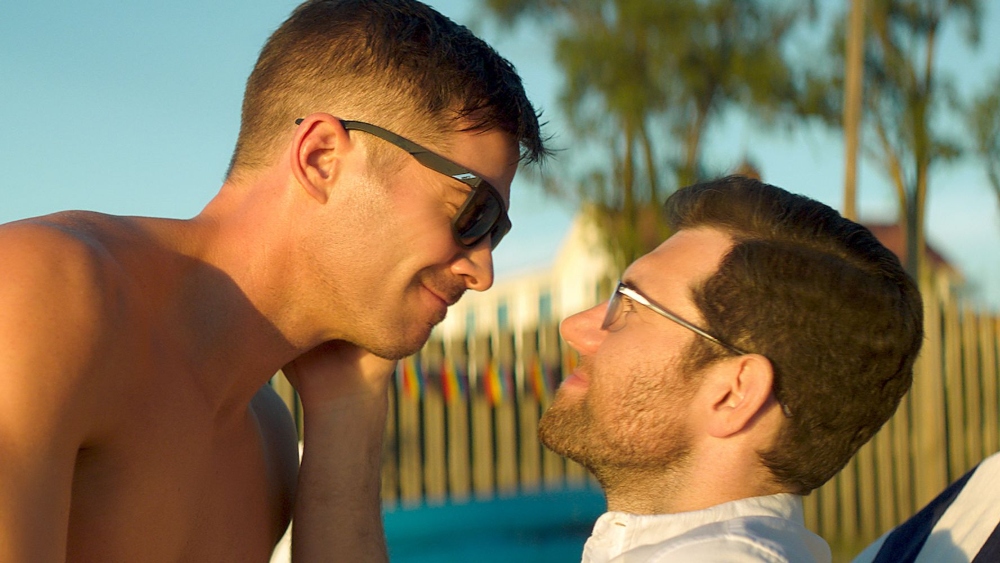
The romantic comedies of prolific director-producer Judd Apatow are the 21st Century’s version of Meg Ryan’s early ’90s hits. The protagonist of the producer’s latest project, Bros, is a single, 40-year-old gay man who is perennially frustrated with his singleness, and telegraphs his generation’s infatuation with the kind of love frequently found in Ryan’s films by repeatedly watching them, whether he’s feeling good or a little down.
Billy Eichner, who wrote the screenplay with director Nick Stoller, plays the lead, Bobby, who, unlike Meg’s iconic heroines, has a very specific reason to persistently disclaim wanting to find a man — in the LGBTQ+ world of 2022, relationships come in many shapes, colors, and even numbers, and a life of monogamy is not the only flavor of the day. But, much like Meg before him, Bobby, in actuality, really does want to find love… and he’s willing to cut a few corners to do so.
In that sense, Bobby is much like others in Apatow’s growing library of characters, including the women played by Amy Schumer and Katherine Heigl in Trainwreck and Knocked Up, respectively — supposedly liberated, modern beings whose outward rejection of love-at-first-sight is really a front for a burning desire to find it. The end result? Bros is one of the funniest romcoms in years, perhaps even since You’ve Got Mail, but it’s one that, like so many others in the modern vernacular, revolves around a message that is on a collision course with itself.
The film begins with Bobby — a famous podcaster — being asked by a movie producer to make a rom-com about gay people that is palatable to straights. “Love is love,” the producer proclaims, echoing a message embraced by modern, supposedly progressive audiences. “Love is not just love,” Bobby protests. Gay love, he explains, is messy — complicated by steroids, threesomes, throuples, poppers, and ever-changing sexual positions. Gay men, moreover, can be self-involved, superficial, and wandering. Relationships in the gay modern world are inherently difficult. (But, isn’t that what Schumer, Heigl, and even Ryan complained about? Aren’t the problems just adorned with a different dressing to cover the same fundamental issues?)
Anyway, Bobby goes out to a nightclub, and soon spots Aaron (Luke Macfarlane) across the distance. The muscled beefcake is not only super dreamy, but he’s also a lawyer with a great apartment and a cute hobby he dreams of pursuing. Perhaps most importantly, he’s a top. Physically, the two could not be more different, especially when it comes to the way in which they present their sexualities. Bobby would be the Grand Marshal of the Gay Pride parade, and is in fact working on opening a Museum of LGBTQ+ History, while Aaron would prefer to “pass” and “not call attention to himself.”

It’s a sad truth of many gay men and yet, Bros is nothing if not hilarious. The cameos by queer celebrities and/or allies are worth the price of admission alone. Bowen Yang and Harvey Fierstein play to mainstay gays as residents of the iconic LGBTQ+ beach mecca Provincetown, Massachusetts, and both are delightful in their limited screen time. There are plenty of other cameos, some well-known, others less so, though I refuse to spoil any of them, as this landmark studio project featuring foursomes and unapologetic gat encounters deserves to maintain an element of surprise.
The film is also fairly original even though the typical rom-com formula is followed almost to a tee, showcasing the get-together, the enamoring, the breakup, and the grand gesture to get back together. The freshness comes from adapting those old tropes for a gay romance — the loud-and-proud kind that most audiences are unfamiliar with compared to films about closeted gay characters wrestling with their sexuality.
Bobby’s self-doubt and his self-deprecating humor make him simultaneously adorable and annoying, like most leads in rom-coms these days. Meanwhile, Aaron’s attractiveness is the reason to watch him, and the script’s attempts to humanize him seem to fail almost as if on purpose. Formula can be entertaining if it has a twist, and since we rarely see two men in these kinds of situations and the unique features of gay dating haven’t really been shown before, Bros is inherently fresh from the get-go. As in most rom-coms, we aren’t really here for the production values, and none jump out here, though none get in the way, either. Instead, Bros rises and falls entirely on the strength of the actors, the persuasiveness of their chemistry, and the ensemble’s comic timing.
And it almost entirely rises — except when it goes a little limp. One wonders why modern scriptwriters feel the need to repudiate love only to desperately embrace it. There are many explanations, though psychology is arguably beyond the scope of a movie review. Perhaps Eichner, single himself, feels the need to say: “I do not really want” something he does, in fact, want, but fears he cannot have? Surely, that is Bobby’s motivation, given that he is surrounded by obnoxiously happy couples including one couple who has been dating a third person for six months. Of course, that offense is fine as far as it goes — after all, Bobby really is showing us that (despite another denial!), gay love is love, because the straight women of today’s rom-coms similarly purport to repudiate monogamous love only to strongly embrace it.

But betraying straight ideals is one thing. My lone annoyance with Bros is when it fully embraces the values of the gay community that it purports to disdain. Billy looks down upon cookie-cutter gays, muscle bunnies, and even the white cisgender men that he embodies. He embraces queer culture and alternative lifestyles, as showcased by the wonderfully diverse cast of queer, trans, and even bisexual people of color that populate his group of friends and the board of his new museum. The movie critiques Brokeback Mountain for having straight actors play gay characters, and Billy even embarrasses himself by aggressively preaching to Aaron’s mom that children should be taught about gay couples in second grade. These are all wonderfully important messages — critical, even — for our community to embrace and champion.
But Bros is often too content to simply pay them lip service. Billy wants a man — a hot, muscular, successful, masculine, white man, who plays lots of sports and acts straight. He wants to settle down in a monogamous relationship. He wants to be exactly like those straight people, those heteronormative people that his creed purports to disown. Maybe there is a grander concept at play — we gays are just like straight people, holding contradictory, self-effacing views, and inconsistent positions. We say one thing when we mean another. And that would be fine, except, of course, Billy begins the movie by rejecting that movie producer’s conceit that “love is love.”
In the end, then, it is not difficult to analyze Bros. It is one of the best, funniest, rom-coms I have seen this side of When Harry Met Sally. It is also, to be sure, a cinematic landmark when it comes to encouraging straight audiences to embrace gay culture. But a subversive, queer, push-the-envelope, stone-throwing Stonewall-rioting picture, it most assuredly is not.
Grade: B+
Bros had its world premiere at the Toronto International Film Festival on Sept. 10 and will be released in U.S. theaters on Sept. 30 by Universal Pictures.





